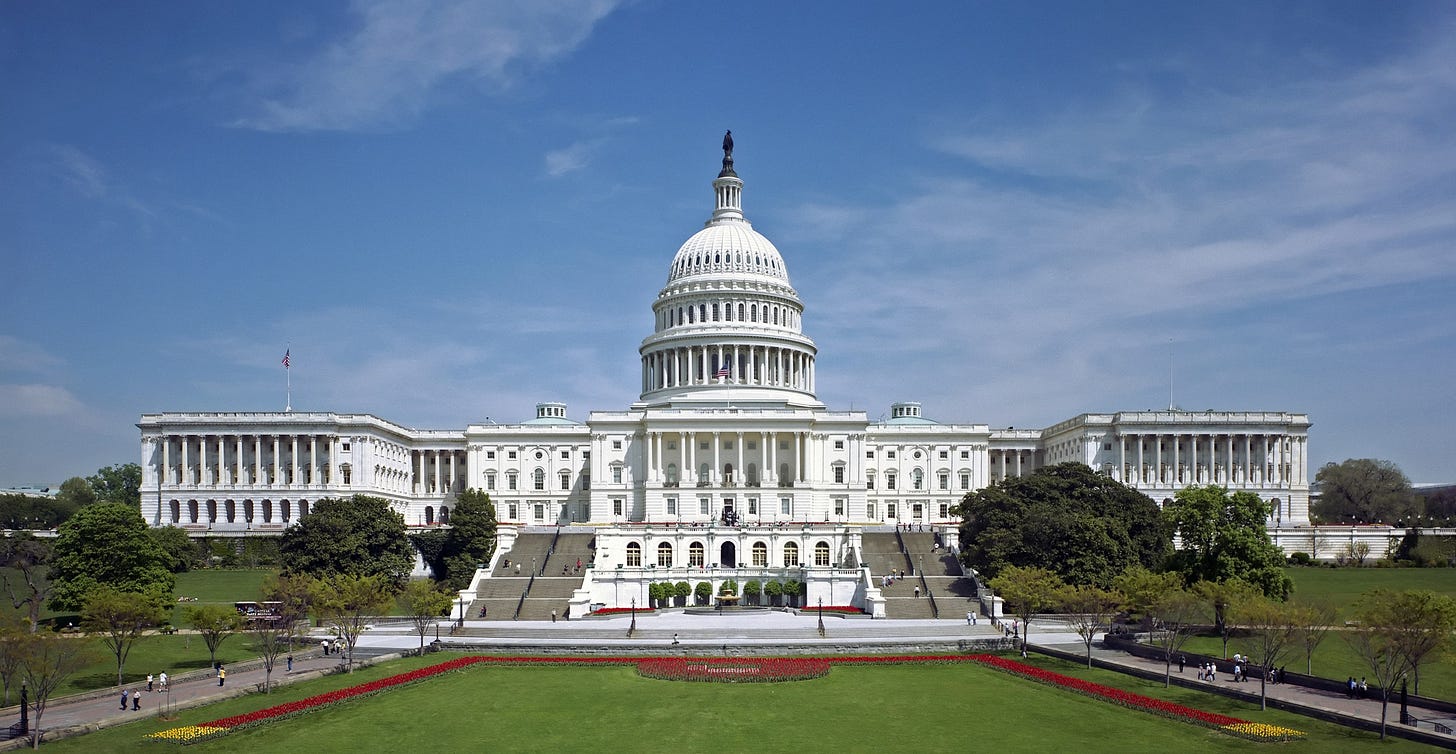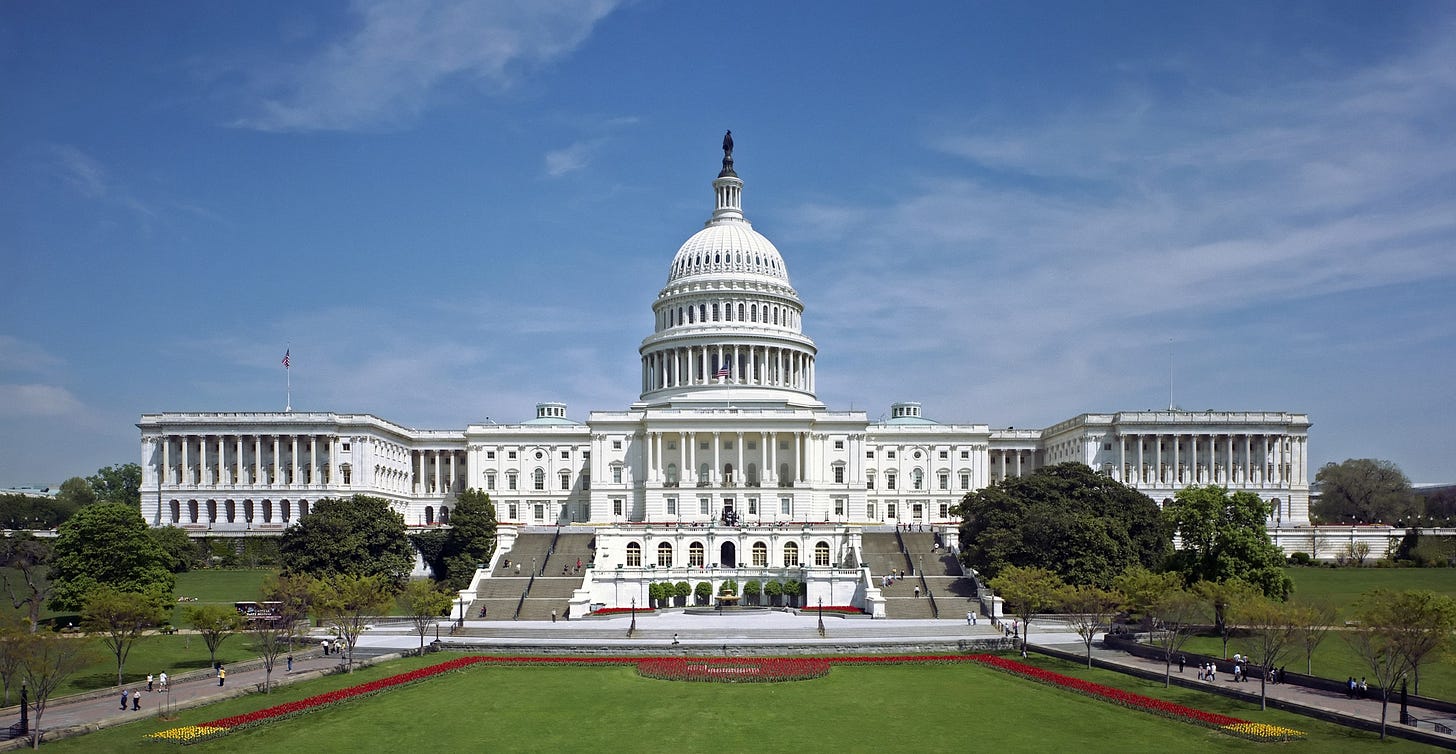It began with George Washington’s declaration of American neutrality in the 1790s war between Britain and France. The Constitution explicitly gives Congress the authority to declare war. From this a reasonable person would assume Congress has the authority to withhold a declaration of war, which would amount to a declaration of neutrality.
Yet Washington took it upon himself to declare neutrality. No one objected to the substance of his decree, none really wanting war. And though sticklers like James Madison grumbled that the executive was intruding on a legislative prerogative, no major protest was mounted. Score one for the president. Score a minus one for Congress.
Washington’s successors lacked his stature, and for decades Congress held the line against additional erosion of its powers. If anything, under the leadership of Henry Clay the House of Representatives and the Senate elevated their standing vis a vis the presidency. The Senate in the 1830s censured Andrew Jackson for his treatment of the Bank of the United States and his firing of the secretary of the treasury. Just after the Civil War the House impeached Andrew Johnson for firing the secretary of war, and the Senate came within a vote of convicting him. Meanwhile Congress wrested control of Reconstruction from Johnson and imposed its own political blueprint on the defeated South.
All the great debates in American politics in the 19th century took place in Congress. The Missouri Compromise and the Compromise of 1850 were compromises between parties and factions in the legislature. The tariff – the most consistently contentious topic in American politics from the 1810s to the 1930s – remained squarely where the Constitution placed it, in the purview of Congress. Several tariffs had names – the McKinley tariff, the Underwood tariff, the Fordney-McCumber tariff, the Smoot-Hawley tariff - and every named sponsor was a member of Congress.
Things began to change about the start of the 20th century. America developed a full-time foreign policy. Part of this was due to the acquisition of the Philippines and other offshore territories, which were administered by the executive. Part reflected the complications with Japan and other countries the new possessions created, complications that fell most naturally to the president. And part reflected the outsized ambition of Theodore Roosevelt, who seized the Panama Canal Zone and unilaterally declared an American protectorate over Latin America.
Further erosion occurred amid the depression of the 1930s. The economic emergency fostered dictatorships in several countries around the world, and though the United States stopped well short of giving the president dictatorial powers, Congress collaborated in a dramatic expansion of presidential power by the creation of numerous new executive agencies that answered to the president rather than to Congress.
World War II and its sequel, the Cold War, shifted the balance of power still further toward the White House. The president and his assistants designed the institutional framework that shaped international affairs in the aftermath of the war. At crucial moments Congress still played its constitutional role. The Senate ratified the North Atlantic Treaty. The House and Senate voted funding for the Marshall Plan.
But when North Korea invaded South Korea in 1950, Harry Truman committed American troops to the defense of the latter without asking congressional approval. He explained after the fact that the threat to America’s defensive perimeter didn’t allow time for the traditional declaration of war by Congress. He contended that the war in Korea was not really a war but a police action under the aegis of the United Nations.
As in the case of George Washington’s neutrality declaration a century and a half before, Truman’s usurpation of the warmaking authority of Congress wasn’t seriously challenged. Amid the red scare inflamed by Joseph McCarthy, no member wished to be seen as opposing anything anticommunist. And as in the case of Washington and neutrality, the failure to challenge Truman on warmaking produced a permanent cession of power to the president. America has fought five regular wars since World War II, and not one has been declared by Congress.
Congress ceded still other powers in the subsequent decades. While nominally retaining its constitutional grip on tariffs and trade policy in general, the legislature allowed the president to impose tariffs and regulations in the event of emergency or in response to unfair trade practices. And it allowed the president to determine when such conditions existed. In 1970 Congress approved the Economic Stabilization Act, which authorized the president to impose wage and price controls when he thought them necessary. Nixon did just that the next year. Congress set broad guidelines on immigration but allowed the president to modify them in the interest of national security – again as defined by the president.
The abdication by Congress continues. Since Donald Trump took the oath of office on January 20, the news from Washington has been dominated by what the president has done or is about to do. Will there be a trade war? Trump will decide. Will ten million immigrants be deported? Trump will decide. Will millions of federal workers be fired? Trump will decide. Will federal grants already appropriated be disbursed to their recipients? Trump will decide. Will American aid to Ukraine continue? Trump will decide.
In each of these and other areas, decisions intended by the framers of the Constitution to be made by Congress are being made in the White House. Congress could reclaim its authority if it chose to. But the Republicans don’t dare to cross Trump lest he unleash his supporters at the next primary, and the Democrats lack the numbers to protest effectively.
Neither party is willing to take a principled position on the relationship between Congress and the president. As much as Democrats dislike Trump’s unchecked authority, they were happy when Barack Obama and Joe Biden wielded the presidential hammer. Neither party wants to roll back presidential power per se, for fear that their party’s disarmament will prove unilateral.
The Capitol still sits at the east end of the national mall. It used to be bigger.







I’m just waiting for Musk to send Congress home. To my eyes, they’ve been pretty ineffective for a long time and the last two weeks behavior hasn’t changed my mind.
Thank you for this enlightened historical analysis of the power balance between our Executive and Legislative branches. It remains true that those who ignore history are bound to repeat it. As much as I respect and agree with the importance of your perspective, I remain very troubled by this Trump guy. His attitude and views parallel some of those of former presidents, especially Jackson, Andrew Johnson and Nixon, but none of them focused on degrading the very Constitution on which our system of government depends. And none ceded political power to an unelected uberwealthy immigrant.
What sayeth you?